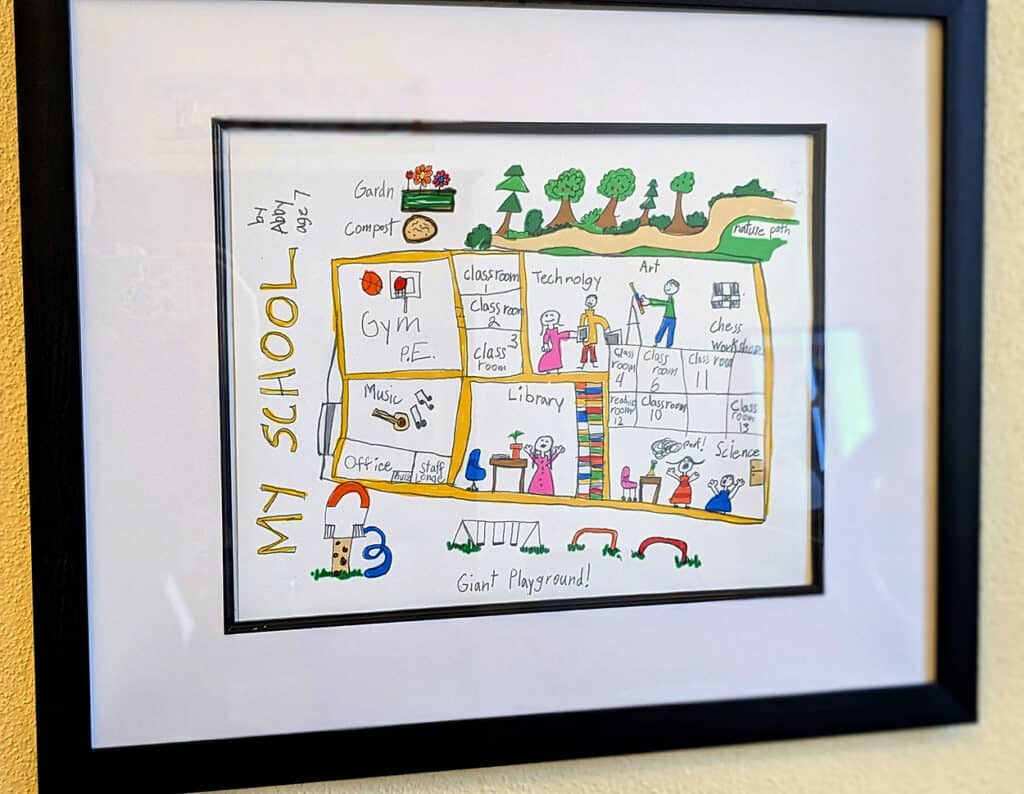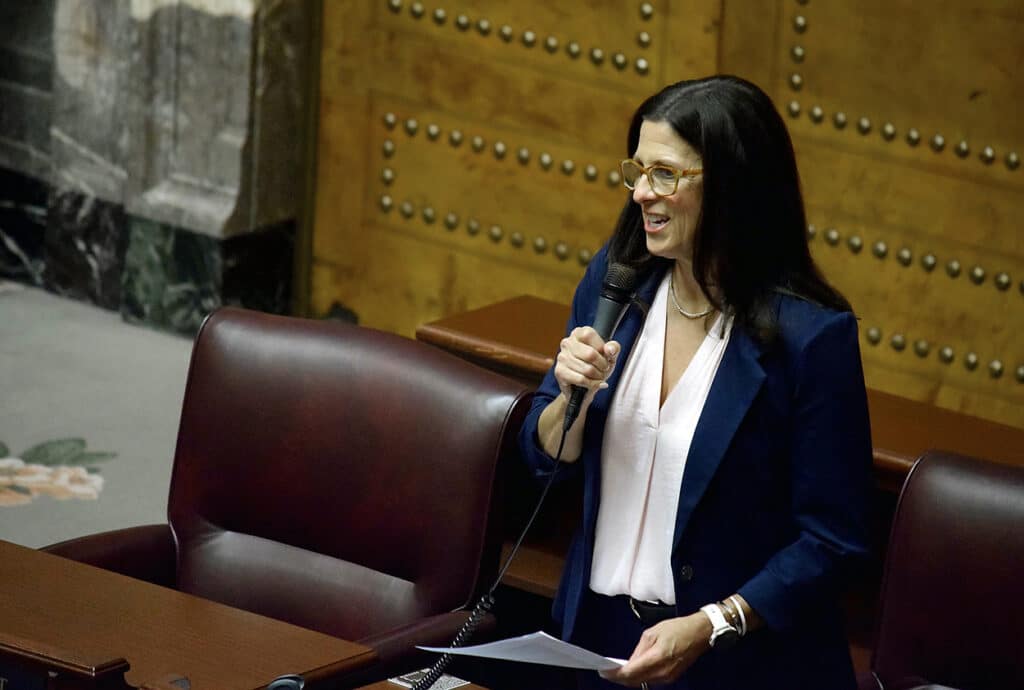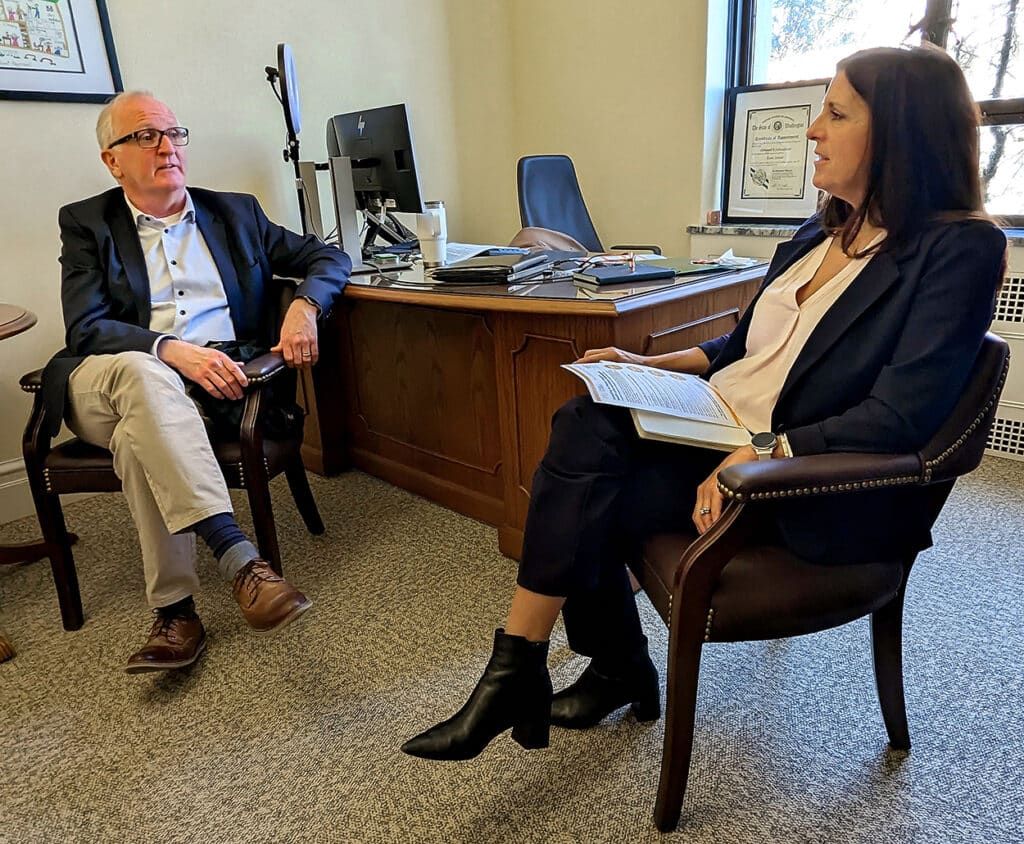Community Education Government
Krishnadasan’s agenda in Olympia includes making it easier to pass school bonds
A framed drawing of a school, made by a 7-year-old, hangs on a wall inside state Sen. Deb Krishnadasan’s office in Olympia. A friend’s daughter drew the artwork using colored pencils, and Krishnadasan used it as a promotional piece in a bond campaign she led for the Peninsula School District in 2019.
Krishnadasan, D-Gig Harbor, worked on bond campaigns from the time her own children – the youngest of whom is now at the University of Washington – were in kindergarten. She finally succeeded in 2019.
By one estimate, more than 200 volunteers worked on that campaign, which voters overwhelmingly approved. Krishnadasan’s leadership, those close to her say, was critical to building the district’s first new elementary schools in three decades.
“That was the first thing I hung up,” Krishnadasan said, sitting in her second-story office in Olympia overlooking the capitol building, 17 days into her first session as a legislator.

A drawing of a school hanging in Sen. Deb Krishnadasan’s Olympia office. Standup for Peninsula Schools used the drawing in a 2019 bond campaign.
Democratic party members and county leaders point to that bond campaign as a major reason why they picked Krishnadasan to fill a vacant Senate seat in Washington’s 26th Legislative District. The district spans Gig Harbor, the Key Peninsula, South Kitsap County and parts of Bremerton.
Learning the ropes
Now two months after that appointment, the former Peninsula School Board president is learning the ropes of her Senate position, while also trying to deliver for her district before beginning a gauntlet of campaigns.
Elected officials from Pierce and Kitsap counties appointed Krishnadasan to the Senate seat in December. She succeeded Emily Randall, D-Bremerton, who resigned following her election to the U.S. House.
Because she won her seat via appointment, not election, Krishnadasan must face voters in a special election in November 2025. The position’s regular four-year term expires at the end of 2026, so she would have to run again that November to keep the job.
Running consecutive campaigns is difficult anywhere, but especially in the 26th District. Randall won the last two senate races by fewer than two percentage points. Rep. Michelle Caldier, R-Gig Harbor, has already announced plans to run for the seat next year.
Voters in unincorporated areas around Gig Harbor, like Artondale, often decide elections in the district, said Luellen Lucid, vice chair of the 26th District Democrats. Lucid recruited Krishnadasan to seek the appointment.
“This is a very purple district. It’s not easy to get people elected,” she said. “You want to find someone who has a broad spectrum of appeal to everything from Republicans to Democrats and independents. [Krishnadasan]’s been very successful at that.”
Lucid worked on school initiatives with Krishnadasan and has encouraged her to seek a state office for years. She described Krishnadasan as a strong campaigner and coalition builder, with a network of friends across the political spectrum.
“She’s not highly ideological. She’s very pragmatic,” Lucid said. “That’s what you need to be able to get elected in LD 26.”
State budget and school bonds
Consecutive campaigns will add to challenges Krishnadasan is likely to experience as a first-year legislator. So will the state’s dreary financial outlook.
As Bob Ferguson, Washington’s first new governor in 12 years, takes office the state is staring down an estimated $10 billion deficit over the next two budget cycles. Lawmakers have not determined exactly how to fill that – through program cuts, new tax revenues or some combination. But the circumstances will loom large over the decisions made in Olympia this year.
As she starts her day at a 9 a.m. staff meeting, chatting with her two aides, Krishnadasan describes the budget as a crisis. As she reviews transportation proposals for highways and ferries, she backtracks: “I don’t want to call it a crisis. The budget situation.”
Whatever it’s called, Krishnadasan is prioritizing projects that support workforce development in light of the circumstances. In her home city of Gig Harbor, 96% of people who work there live outside city limits. First responders, teachers and others on modest budgets cannot afford to live there, she said.
Her other major action thus far is sponsoring a bill that would make it easier for school districts to pass bonds. State law requires bonds to receive at least 60% approval from voters. Krishnadasan wants to lower that requirement by 5%.

State Sen. Deb Krishnadasan, D-Gig Harbor, speaks on the Senate floor for the first time in support of Washington’s National Guard on Jan. 29.
That tweak would have allowed an additional 30 school districts to build new schools and relieve overcrowding, she said. That includes the South Kitsap School District, which has not passed a bond since 1988, despite having three campaigns receive over 55% approval.
“Every student deserves to learn in a safe, modern school building, but in far too many districts, that promise is not being fulfilled,” Krishnadasan said in a statement. “This bill is a thoughtful compromise that will ensure our schools can meet the needs of our students and teachers while still reflecting the will of the majority of voters.”
A day in Olympia
Today is a “light” day. Only one committee meeting, a caucus with Democrats and a dozen 15-minute meetings scheduled with constituents ranging from health care providers to school leaders.
“We’re still trying to figure out how to find time for breaks,” Krishnadasan says, admitting she has forgotten to eat on a few occasions. “We’re getting better at it.”
During her first meeting of the day, Krishnadasan chats with a union officials representing employees at correctional facilities. Raised on a farm in Puyallup by a father who belonged to a construction union, she says she has an affinity for labor groups.
The union members are there in support of bills providing better retirement plans, pay for striking workers and PTSD care. As the meeting ends, Krishnadasan says she will look into them. One of the members thanks her, saying they know “there’s a lot of people like us asking for your time.”
After snapping a photo, Krishnadasan takes the stairs down to her Education Committee meeting. Before starting the session she worried about being chained to her desk all day. But she still gets “her 10,000 steps in” every day, she said.
In the afternoon, Krishnadasan speaks on the Senate floor for the first time in her career. Following in the footsteps of her predecessor, Randall, she delivers a short speech in support of a resolution recognizing Washington’s National Guard Members. A dozen members dressed in uniform sit upright in the balcony above.
After a caucus with fellow Democrats runs long, Krishnadasan is back to meetings. She comes in halfway through a chat between her aides and staff of Peninsula Community Health Services about a new medical respite center in Bremerton.
Fifteen minutes later, administrators from Pacific Lutheran University in Tacoma stepped into her office. Before the meeting ends, PLU President and Gig Harbor resident Allan Belton brings up the 2019 school bond.
“Thank you for passing that,” he says. “Artondale [Elementary] is amazing.”

State Sen. Deb Krishnadasan speaks with Pacific Lutheran University President Allan Belton during a meeting in her office on Jan. 29.
Stand up for Peninsula
Krishnadasan began volunteering with the Gig Harbor schools after relocating to the city in 2008. Voters elected her to the school board in 2015 and she was its president between 2019 and 2021.
She also founded Stand Up For Peninsula Schools, a volunteer advocacy group that worked to support district levy and bond campaigns.
Jennifer Butler, a current Peninsula School Board member, said she stuck with the group because Krishnadasan “was easily one of the finest leaders I’ve ever worked with.”
“She was inspiring, she was fun, she was smart, and she listened like nobody I’ve ever seen,” Butler said. “She has a very, very deep authentic devotion to children and learning and curiosity.”
Butler worked with Krishnadasan on a bond proposal in 2018 that secured 59%, one point below the supermajority threshold needed to pass. It was a devastating blow, she said, but Krishnadasan never wavered.
“She never once let that deter us from getting back up and going at it again,” Butler said. The next proposal secured 67% approval. “An eight-point swing in less than a year, which is pretty insane,” Butler said.
The proposal built two new schools and replaced two others. Butler said that significantly reduced overcrowding at elementary schools. At the time the district had makeshift classrooms and study areas set up in hallways. Portable classrooms housed one-third of elementary students.
“They were able to help tell the story about why the levies and bonds were so critically important,” said Miriam Battson, president and CEO of the Gig Harbor Chamber. The chamber recognized Krishnadasan, Butler and Shana Nash as Citizens of the Year in 2023 for their work.
“The district has been able to use the approved funds to build new schools and upgrade several others within the district,” Battson said. “Without that work it might not have happened.”
